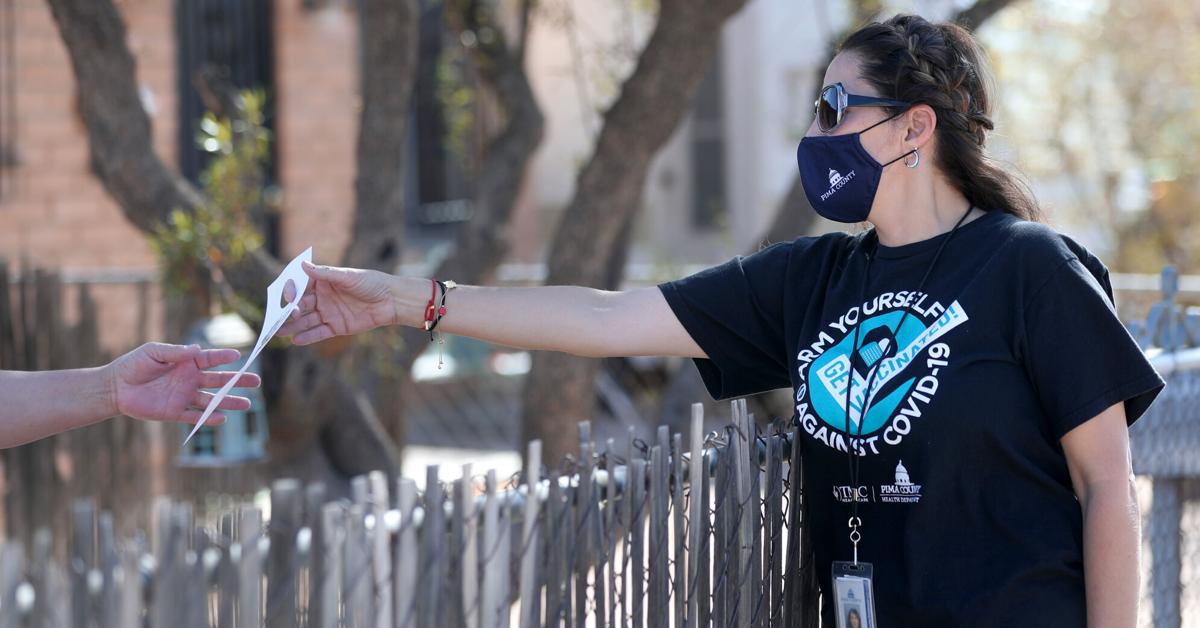If you’ve wondered if you can drink alcohol or smoke marijuana after getting the COVID-19 vaccine, you are not alone.
It’s a “very common” question, said Martha Ochoa, a community health worker for the Pima County Health Department.
She goes to neighborhoods to encourage residents to get vaccinated. She knocks on doors, hands out flyers and — perhaps most importantly — she answers all kinds of questions.
The short answer to this particular question is, “yes,” you should get vaccinated even if you plan on drinking alcohol or smoking marijuana. It is safe.
“There’s no evidence that the vaccine has a negative interaction with either alcohol or marijuana. There’s no evidence that it harms people,” said Dr. Elizabeth Connick, who is chief of infectious diseases at the University of Arizona.
In terms of the effectiveness of vaccines in general, however, it may matter how much you drink.
“Moderate alcohol use is actually associated with better immune responses than no alcohol use, or heavy alcohol use,” Connick said. “So a little bit of alcohol if anything is good. A lot is not good.”
While this is good news for moderate drinkers, it’s important to remember that moderate drinking is one drink for a woman and two drinks for a man.
In general, data show that people who drink heavily have much more infections and worse immune responses, Connick said. “So presumably the alcohol is blunting their immune response.”
The COVID-19 vaccine helps the body produce antibodies that protect against getting COVID-19, but at this point scientists don’t know how long these antibodies last.
“The only concern would be: If you drink heavily does it blunt your response to the vaccine? Will you have weaker antibodies? Will they wane over a shorter period of time?” Connick said.
Heavy drinking could also make you feel sick with a hangover while you also deal with the side effects from the vaccine.
There is no data to say if heavy drinking makes side effects worse, Connick said. “But a reasonable person can know that: How would you distinguish between being hungover and the vaccine side effect? You can’t tell the difference, right? you feel terrible.”
People who heavily use alcohol, or marijuana, can still die from COVID-19, just like anyone else. So they should still be encouraged to get vaccinated, Connick said.
People with substance abuse disorders may have higher rates of COVID-19 vaccine hesitancy. In a study published this year, the Addiction Policy Forum interviewed people with substance abuse disorders to gauge their trust in the COVID-19 vaccine. Nearly half, or 48%, of the study’s participants said they were either unwilling to get the vaccine or uncertain if they would.
Meanwhile, research suggests that people with substance abuse disorders have a higher risk of developing COVID-19.
More data needed on marijuana
Connick could reference data to talk about how alcohol may impact the effectiveness of the COVID-19 vaccine, but there isn’t much for her to reference regarding how marijuana may impact the effectiveness of the vaccine.
“There are no data on marijuana. I cannot make any statements around it,” She said. “I simply don’t know, but I don’t know that anybody else does either.”
“The vaccines were studied primarily in people who were not heavy marijuana users,” she explained. “But some of those people probably did use marijuana. (Researchers) don’t have data on it, so we can’t make a recommendation. Use your own good judgment.”
Still, it’s important for marijuana smokers to protect themselves against COVID-19 by getting the vaccine, according to the Public Health Association of British Columbia in Canada. Their website references “emerging evidence” that suggests marijuana smoke can harm a person’s respiratory system and immune competence.
What about partaking before the shot?
As for getting your COVID-19 vaccination while under the influence of marijuana or alcohol, it won’t react harmfully with the vaccine, but it still may not be a good idea.
“Having consumed alcohol and marijuana is not a contraindication to vaccination,” said Dr. Joe Gerald, an associate professor with the University of Arizona’s College of Public Health.
By that he means that it doesn’t make the vaccine risky or prevent you from getting it, in and of itself.
“There might be reasons why a healthcare provider might decide not to vaccinate someone who’s impaired . . . But thinking about just strictly speaking the health consequences and the effectiveness of the vaccine, being under the influence is not a contraindication,” he said.
“There are lots and lots of reasons not to show up at the vaccine site drunk or stoned.”





